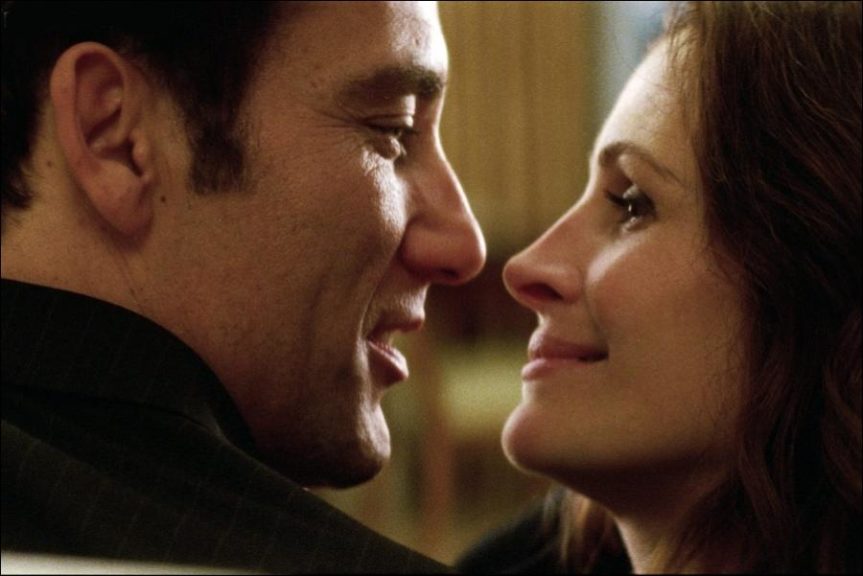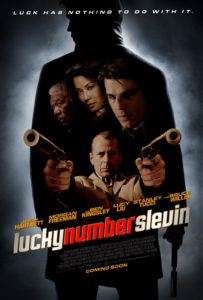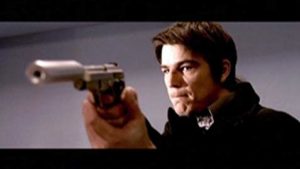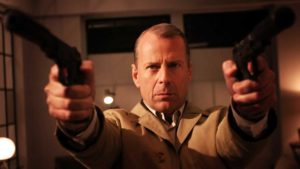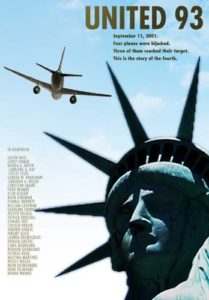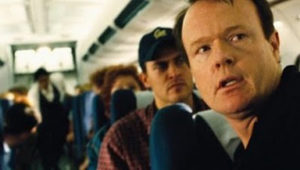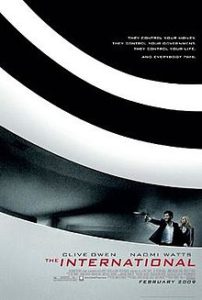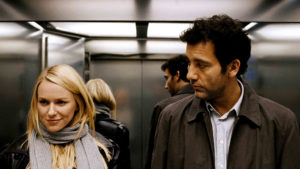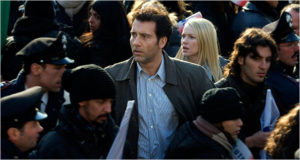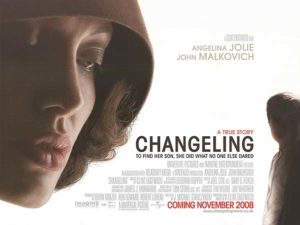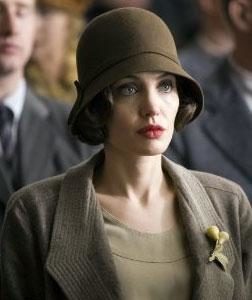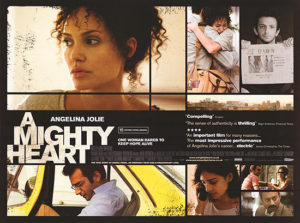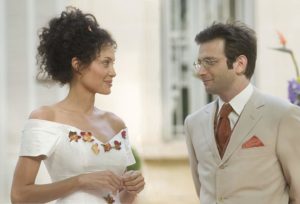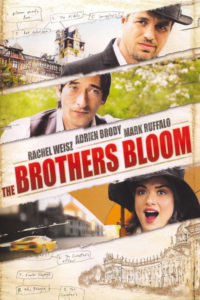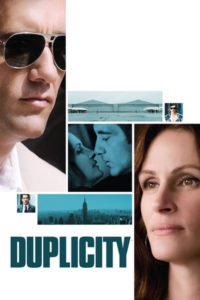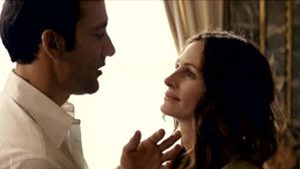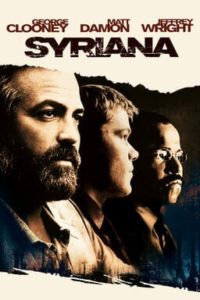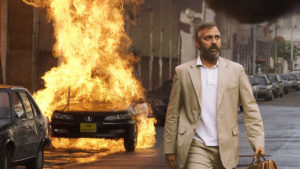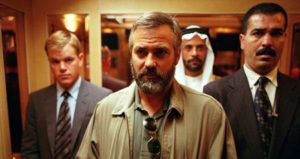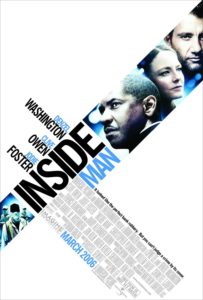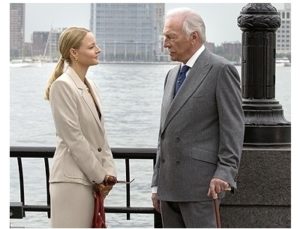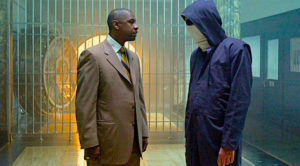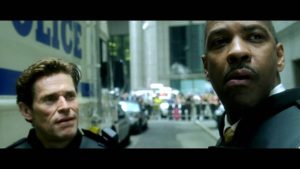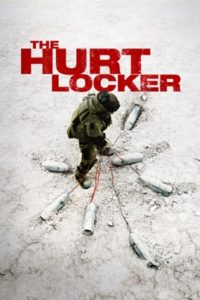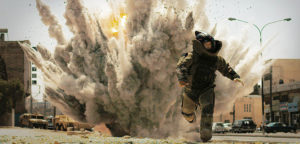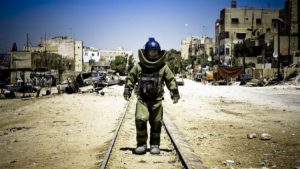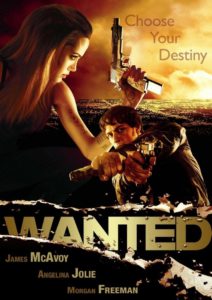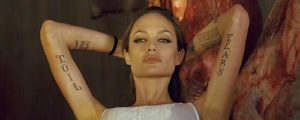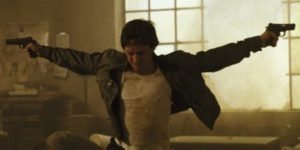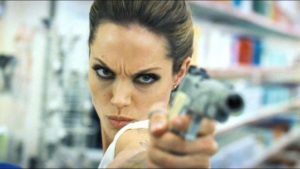From 2005 to 2009 I was a programmer on CKDU 88.1 FM in Halifax, every Sunday morning hosting The Love & Hate Movie Show. I talked about what I was seeing and revisited some of my favourite films of old, pretty much what I do now here on FITI. I still have a lot of the scripts from those days, and thought I should share them here (with some editing and updating) for archival reasons—and just for fun.
I’ve shared a few of these reviews already, starting in August 2015. Here are reviews of the first batch, films that premiered locally at the Atlantic Film Festival, a few horror titles, five-star features , a few disappointments., some charming indies, 13 blockbusters. and a few comedies.
Here are reviews of movies that bring the suspense.
Lucky Number Slevin
This film is directed by Paul McGuigan, the Scottish born director of Gangster Number 1 and Wicker Park, a little-seen Josh Hartnett drama from a few years ago. Here we have a Tarantino-eque crime caper, with Hartnett as a guy who comes to New York, staying at a buddy’s apartment, and discovers his buddy owes money to two gangsters, The Boss (Morgan Freeman) and The Rabbi (Ben Kingsley). Hartnett takes up the debt because everyone thinks he is his friend. Meanwhile he starts a sort-of romance with Lindsey (Lucy Liu) who lives next door.
The script is surprisingly clever, with solid turns from character actors, but as the revenge plot is revealed, giving the preceding stuff a bit more weight, the characters remain flat: you don’t wind up caring very much about any of them. There’s a bit of the adaptations of Dashiell Hammett’s Red Harvest: Yojimbo, Fistful of Dollars, even Bruce Willis in Last Man Standing, all the story of a tough guy who comes into a town and sets two warring gangs against each other, exploiting both. Speaking of Willis, he’s good here, though he sports a patch of particularly bad hair. We also get references to James Bond and North by Northwest.
Hartnett is as good as I’ve seen him in anything since The Virgin Suicides, but that’s not saying much about the actor who hasn’t thrilled as a leading man—he proved in Penny Dreadful that he’s really a character actor. I was keeping my fingers crossed it would be a broader comedy—it should’ve been played for bigger laughs, and Hartnett might’ve been even more effective as the straight man.
United 93
Paul Greengrass is the director here, best known for Bourne two and three, who helmed Bloody Sunday and scripted a great docudrama based on the true story of the bombing of an Irish town called Omagh. United 93 is told in real time—split between what is happening on the ground at air traffic control and what is happening on this one flight, one of four hijacked planes on September 11,, 2001.
This is visceral filmmaking, and very difficult to watch. In places, it’s enormously affecting. It’s not sensational, there are no dramatics, no mythologizing, at least, not in an obvious sense. The existence of the film creates a mythology, I guess. The audience gets to be another passenger on that plane, to sit in a vacant seat and watch what unfolds. Of course, you ask yourself what you would have done, but that’s not the point. The point is to witness and to understand what, with all plausibility, happened that day. It just feels very, uncomfortably real, from the portrayal of hijackers, the care and accuracy that has gone into the characters, to having actual people on the ground playing themselves.
Hollywood needs to tell stories about heroes. They did Hotel Rwanda, about the horrible genocide, and no one said, oh, it’s too soon to tell that story. There’s been controversy about this one, but I don’t think it’s insensitive of the industry to make this film, a testament to courage, especially as the story is told so well.
The International
Director Tom Tykwer (of Run Lola Run, Heaven and Perfume: The Story of a Murderer) couldn’t have known when his thriller was green-lit that when it was released the term “banker” would be a four-letter word, the villain of the day in 2009. I don’t think it’s helped the box office of the film, but it does seem terribly prescient.
Clive Owen is Louis, an interpol agent. He used to be in British law enforcement, but left his position there when he refused to be part of a cover-up. Now he’s on the trail of a bank out of Luxembourg, whose MO is to invest in arms deals, setting itself up as a go-between with the Chinese manufacturers and the Middle Eastern and African clients. Louis is obsessive and driven, and is close to a break in this case when a colleague is murdered right in front of him.
When they spell it out, what the bank is up to, it sounds all dire and insidious, but—and maybe I’m already really cynical—I was saying to myself, so what? You mean banks don’t already invest in arms manufacturing and distribution? There’s a lot of money in that business. Seems to me a lot of banks would be into that.
With the help of Naomi Watts, who is playing Eleanor, a New York District Attorney investigating the Manhattan branch of this bank, Louis gets deeper and deeper into what this bank is doing. They go to Italy to interview an Italian financier, but he is assassinated on the day they’re going to speak with him. The only evidence, a specially designed boot print on a rooftop, left by the shooter.
Now, I don’t know about this. I expect my high tech espionage thrillers to be a little more high tech than this, that the one piece of evidence left behind is a boot print, and not just any print but one left by someone with an artificial leg. What is this, the Hardy Boys?
Anyway, the first act drags a little, despite the slick cinematography and intrigue, which I did enjoy. It felt a bit like a lesser Bond or Bourne picture, but without a lot of the physicality. When it does come, in a shootout at the Guggenheim Museum, it’s the best action sequence I’ve seen in ages, and it makes me wish there were more in this movie.
Clive Owen is fine in the role, a slightly ragged around the edges victim of his own obsession. He delivers the lines, even the riper ones, with the conviction they need. I like Naomi Watts, but she feels a bit miscast. There’s nothing New York in her accent, nor does she seem to have the determination her character requires. If she was playing a DA from Amsterdam or Paris, I might have believed her.
Anyway, once the amazing Guggenheim sequence takes place, the third act comes together at a much better pace and suddenly it’s all wrapped up nicely, with bullets and blood vengeance, not international litigation.
I really have a soft spot for this kind of movie, the international espionage thriller, and for the director, Tom Tykwer, but I don’t think I can recommend it to anyone but genre keeners like me.
Changeling
The title card says “A True Story.” In 1928 single mother and LA resident Christine Collins’ (Angelina Jolie) son Walter vanished from his home. Collins spent months looking for him, and the LA police department, at the time a hive of scum and villainy, presented her with a boy who she said wasn’t her son, but they bullied her into accepting the kid for the good publicity. Refusing to give up, she continued to push the police to keep searching for her son, and with the help of a local reverend (John Malkovich) put together a campaign to embarrass them. They declared her unstable and her thrown into the local asylum.
Clint Eastwood, having in the past few years delivered the Oscar nominated and winning Mystic River, Million Dollar Baby, Flags of Our Fathers and Letters From Iwo Jima, has become some kind of master of the serious-but-economically-told melodrama. There’s a refreshingly old-fashioned way his stories unfold on screen, and I genuinely enjoy his work. I also remind myself he’s someone who shoots very quickly, picks his crew very carefully. He doesn’t believe in long shooting days, which is uncommon in the movie biz.
This is another solemn drama from Eastwood. The injustice depicted will definitely anger some people, but it makes the eventual comeuppance certain characters receive that much more satisfying. The wardrobe and sets are amazing, providing a great sense of time and place. Jolie is excellent. There have been times when she isn’t playing a superspy I find her almost unearthly, but she is definitely the human core of this film, and does a great job in the role. And Malkovich, though not in the movie that much, is excellent in a typically Malkovichian part, playing a character who is intellectual, angry and fey, all at once.
I did feel as though the film went on a little too long. It was one of those stories that seemed to have multiple endings, just when you thought it was done there is more.
A Mighty Heart
This is one of those pictures that will shock those who are used to their summer movie entertainment to have no serious thought at all. I predict this film will be this year’s United 93, a picture a lot of people will simply avoid because it deals honestly with what goes on the front page of our newspapers: the war in the Middle East, and its toll. The fact that it is one of the year’s best films probably won’t fizz on most folks, which is too bad. I think it’s a movie that should be seen. And those of you who avoid blockbuster Hollywood product shouldn’t be put off that the film was produced by Brad Pitt and stars Angelina Jolie.
The story is based on the memoir of Mariane Pearl, the widow of Daniel Pearl, American journalist for the Wall Street Journal who, following 9/11, went with his wife to Pakistan to cover the fighting against the Taliban in neighbouring Afghanistan. He pursued stories there for some time, along with his wife, who is also a journalist, and they were on the verge of leaving the country when Pearl disappeared one night in Karachi when he was to have met with a fundamental Islamic cleric.
The story is akin to Missing, the Costa Gravas film, where a small group of western people look for a man in an environment alien to their experience. Though the conclusion of the search is known to most from the beginning, the experience of it is what gives the film its meat and its suspense. There is a growing sense of dread throughout, as Pearl mounts what seems to be a military campaign from her friend’s home in Karachi, coordinating with local authorities as well as American investigations.
Now, before you think this some kind of glossy vanity project, the star of the picture is not Jolie. Oh, she’s great in the role, her best since probably Girl Interrupted. She plays Mariane as a calm presence in the midst of what can only be described as sheer terror. It’s also not difficult to believe her as someone who is very strong, with plenty of inner courage that only breaks on the very rare occasion when faced with undeniably bitter reality. ( 2019 edit: It’s interesting to consider whether Jolie would have taken this role now, given Pearl’s ethnic background.)
But, as I was saying, she’s not the real star of the movie. The star is director Michael Winterbottom and his vision of Karachi. The city exerts this incredible force on the film, as a place where the actual population is unknowable because proper records aren’t kept. It just keeps growing. Winterbottom, British director of films such as 24 Hour Party People, 9 Songs, Road to Guantanamo, Code 46, Wonderland and Tristam Shandy: A Cock and Bull Story does very well with very docudrama style, lots of jump cuts, lots of great sound and lit in such a way without considering the vanity of the actors. In this he shares a vision with Paul Greengrass, director of United 93 and the last two Bourne movies. Also think of Spielberg’s Munich, which had very detailed recreations of the 1970s but also used a lot of hand-held camera, which creates a certain kind of intimacy.
The film makes no effort to hide its liberal attitude, politically. It does have some subtle criticism of American foreign policy and of the disconnected way well-educated people from the west come into middle-eastern culture with very little idea of how things work on the ground. But mostly it’s a story of journalists who have some perhaps outdated ideals of bringing truth and understanding to the world, and the price they sometimes pay in light of war, of fundamentalist movements, and desperate men. A Mighty Heart is potent and unforgettable.
The Brothers Bloom
Rian Johnson directed the excellent Brick, and more recently Looper and Star Wars: The Last Jedi. This follow-up is well started, though the follow-through muddled. Rachel Weisz is great, but maybe Mark Ruffalo is a little miscast.
Adrien Brody and Ruffalo are the eponymous brothers, chapeau-ed con artists who’ve been loving the grift since they were kids. With associates Bang Bang (Rinko Kikuchi) and The Curator (Robbie Coltrane) they plan to take a small fortune from Penelope (the wonderful Weisz), an heiress who likes to collect hobbies and drive Lamborghinis. Think of it as Wes Anderson meets Dirty Rotten Scoundrels. There’s plenty of quirky charm, gorgeous locations and an especially game cast, but the key to great con artist pictures—going back to Newman and Redford in The Sting—is a killer twist that takes us by surprise. The surprise here is missing.
So, a let-down in the third act, but still a fun movie to catch on a non-demanding afternoon.
Duplicity
Tony Gilroy has carved himself out a niche in Hollywood as a purveyor of fine, intellectual thriller material. He wrote the screenplay for the highly underrated Proof of Life, as well as all the adaptations of the three Bourne movies, which for my money, is one of the best action thriller franchises in Hollywood history. Then he tried his hand at directing, bringing us the haunting and twisty Michael Clayton, with George Clooney in one of his best roles, also giving Tilda Swinton her Oscar.
Gilroy has a thing for the individual against the corporate structure, and also really enjoys flashback structures, the bait and switch, so as an audience we are always working to understand the plot and motivations of the characters. Duplicity has that same twisty structure, taken a step further, with every plot twist in the present informed by stuff going on in the past.
The story goes like this: Julia Roberts (slightly pinched) is Claire and Clive Owen is Ray. She works for the CIA, he for MI6. They first meet in Dubai in 2003 where she beds him, drugs him and liberates some documents he’s carrying, then they meet again five years later, both now in the service of the private, corporate world: shampoo giants, at least one loosely based on Procter and Gamble, represented by the hyper-competitive CEOs played by Tom Wilkinson and Paul Giamatti. Claire is a double agent, planted to figure out the new product being developed in the competition’s labs, and he is brought in to be her contact in the opposition. But did they really again meet after five years, or was it only three?
The world of these corporate counter-intel operations is fascinating, and presented at such speed and dexterity that you really have to work to keep up with what’s going on. And though the plot isn’t entirely airtight—I did have a couple of questions at the end about how one character managed to get in possession of a key bit of information when he was busted trying to scam it—it is far more well constructed than your average thriller, and in that, Gilroy deserves huge props.
I find that Roberts’ natural likability onscreen actually works against her in this part. It’s hard to believe she’s really a selfish and conniving, insecure spy because she seems so damn warm. It takes away some of the suspense because you never really think Claire will leave Ray out in the cold. Femme fatale just isn’t Robert’s strong suit. You put someone like Catherine Zeta Jones in this role, and you’d believe pretty quick she’d deliver the hammer.
That said, Owen and Roberts are very good together, they do have chemistry. He can play this role in his sleep. It’s a variant on the guy he was in The International: smart, driven and very cool. He looks great in the suits. They’re both so good looking and relaxed, carrying a movie of this scale, with a half a dozen exotic and not-so-exotic locations, from Rome to Cleveland, and it’s no problem for these two. This kind of star power is undervalued these days. It’s great to see it flexed.
If I had a gripe, and I did, it’s that it never really gets really mean and nasty, not like, say, The Grifters. Some genuine bitterness and triple crosses might have made this story really draw blood. Nor does Duplicity find a romantic core. Compare it to Out of Sight, Steven Soderbergh’s delightful caper from 1998. In it you have a similar flashback heavy structure and smart, stylish lovers at odds with each other in a romantic crime thriller. But, by the end, you really cared about what happened to Jack and Karen, and that wasn’t because Clooney and Jlo had chemistry that was so much hotter than Owen and Roberts, its more that those characters were just more relatable.
All this said, I have to admit, the last Tony Gilroy movie, Michael Clayton, I enjoyed much more the second time when I struggled less to penetrate the plot intricacies. Maybe Duplicity is just owed a second viewing. As it stands, it is worth a watch by virtue of it being such a bit of an aberration in a film industry that really doesn’t produce or reward this kind of smart very often.
Syriana
This is an ambitious film about covert American foreign policy in the Middle East, and how it relates to oil interests. George Clooney is a bearded, slightly paunchy CIA agent Bob, a man in the field who’s become something of an anachronism in this era of high tech weaponry and laser guided smart bombs. They can’t find him a desk job, so they just use him for sticky work. At the same time, Matt Damon plays Bryan, a consultant for the energy industry who, through a personal tragedy, gets access to Alexander Siddig’s Prince Nasir, the first in line to be the Amir of an oil-rich Middle Eastern State. The problem is, the CIA want the less-socially conscious younger brother to be Amir, the younger brother who will be a pawn for American oil. Meanwhile, Jeffery Wright is Bennett Holiday, an American lawyer working for a huge oil conglomerate to figure out if one of their recently acquired subsidiaries broke international law when they secured the oil rights to Kazakhstan. Finally, we meet two young men who had been working in the oil fields but are laid off and wind up getting involved with a fundamentalist terrorist group, armed with a rocket by Bob. You see how it all ties together, No? Well, I don’t entirely blame you.
I did really like the film, but at times found it to be frustratingly opaque. For instance: the Jeffery Wright character and his friend/father(?) who’d hangs out on his doorstep. What was that about? I also thought the subplot involving the oil field workers was a little simplistic. Okay, fair enough, young men are recruited into fundamentalist organizations all the time and they sometimes are so because they can’t get work at oil fields, but their story just seemed to be there less for reasons of drama and more to be didactic. The relationship between Matt Damon and his wife, played by Amanda Peet, really got the short shrift. Why did Matt Damon feel the need to yell all the time? And I’m also not sure I understood how the American oil interests defrauded the Kazakhstan government. I may have to see it again to get the full picture.
This film was directed by Stephen Gaghan, who also wrote Traffic, and I can see the comparisons. But Traffic was better in the character relationships, they were stronger and gave you more emotional connection.
That said, I really admire the ambition of Syriana, and the fact it places the blame for the inability of real visionaries in the middle east to make any progress on the hands of big companies and underhanded American governmental agencies. It’s the scope of the film that impressed, and even though the plotting is occasionally too dense, it’s worth the struggle.
Inside Man
Four bank robbers invade a bank in lower Manhattan. They take about 30 hostages. They’re professional and cool. Denzel Washington and Chiwetel Ejiofor play cops with maybe not such squeaky clean background—Washington’s Detective Frazier may have absconded with some drug money earlier in his career. Willem Dafoe is the tactical officer, and Christopher Plummer is the millionaire who started the bank, and has something inside it that he needs to keep hidden. This item becomes part of the deal, though it’s never explained why he keeps it. He hires Jodie Foster, who is a real estate agent with a sideline in getting things done for powerful people, to pressure the mayor to let her into the crime scene and to negotiate with the bank robbers. And it’s Clive Owen, who spends most of the film with his face covered, at the core of the heist.
It’s an entertaining piece of genre filmmaking, suspenseful, with actors doing sterling work. Spike Lee brings in a lot of great New York City touches with the day players, the hostages especially, many of whom are interviewed through the course of the movie as we flash forward to the week following the bank robbery. I’m thinking specifically about the little boy and his video game and the Sikh who wants his turban back. Lots of comments on class, on race, and on New York post 9/11, which make the piece feel more real, contemporary, and more alive.
Sadly, the last thirty minutes or so kind of ruined it for me, once one of the supporting characters has access to the bank after the siege is over, there’s a major plot issue. I also struggled to understand Jodie Foster’s character motivations—her character is painfully underwritten. Maybe I’m just not clever enough, or maybe there are some serious problems in the end on how the picture resolves its plot. If there is one thing a heist-thriller should have, is air-tight mechanics.
If I think of the great ones of the past, Thief, Killing Zoe, or Rififi, this one isn’t nearly as interesting, despite some good performances and stylish direction.
The Hurt Locker
This Oscar-winning film was directed by Kathryn Bigelow, with a screenplay by Mark Boal, who would work together again on Zero Dark Thirty and Detroit.
The film starts with a quote by Chris Hedges calling war a drug. It’s a hell of the thing to try and convince us, but when the soldier is obsolete in modern warfare, what good is he? Here the soldier is an occupying force, the addiction is to stay alive in life-threatening situations, when that becomes your normal and the thrill of dealing with it becomes an every day reality.
The Hurt Locker isn’t a complex film in terms of structure. It’s basically a three-hander, we follow a little over a month in the lives of three US soldiers in Baghdad who are the bomb squad. They go in to situations where there might be unexploded ordinance or a bomb planted in a street, and they defuse it. Well, one guy does the defusing in a big suit that looks like a Grizzly Proof suit that only sort-of works to protect him, and two others back him up with machine guns.
The film doesn’t try and show the US military in a particularly positive light. They are doing an impossible job in a hostile environment, that’s clear and there is some empathy to be had from observing that situation, but they’re obviously not welcome, given the life-threatening situation they’re in every day.
The pointlessness of their work does come clear as the film goes on. It’s very matter of fact and the movie is smart enough to leave the broader perspective in the audience’s heads to focus on the day-to-day of these super-motivated men. Unlike the ignorant soldiers in Brian De Palma’s Redacted, to name another on-the-ground Iraq War drama, these guys are fairly reasonable dudes doing a very difficult job. The star-making performance here is Jeremy Renner as James. As the story progresses we see how his getting to know the locals affects his emotions, and how he interacts with the men around him. We start to understand that he doesn’t even understand the reasons he does what he does, just that he must. This is who he is.
In the past three years we’ve seen a lot of Iraq War movies, or movies influenced by American foreign policy: Syriana, Body of Lies, Rendition, Stop-Loss, Grace is Gone, In The Valley of Elah and The Lucky Ones, they keep coming out and they keep failing to make a splash at the box office. You know, people complain that Hollywood refuses to make compelling or provocative films, and maybe, on the whole, that’s true. But filmmakers keep insisting on telling these stories, even when it’s been proven there’s not much money in it. That shows that there is still is a counter-culture spirit in Hollywood, and that can’t be a bad thing.
Wanted
Meet Wesley Gibson (James McAvoy). He’s an accountant in a cube farm office. He has no presence on Google. He narrates the story of his really dull life, where he can get no satisfaction. Not from his obnoxious cartoon of a boss, not from his best buddy who is having sex with his girlfriend. He’s basically the guy who Edward Norton played in Fight Club, desperate to find a way to be a man. Well, it turns out that Wesley is the son of one of the world’s great assassins. Dad was part of something called The Fraternity, the most ethical bunch of killers you’ll ever come across, but early on Dad his gets killed by a gifted but rogue member of that squad. And, apparently, Wesley has the same instincts in the blood, just waiting to be put to good use. It doesn’t take long until it does, starting with having to shoot wings off flies. Yeah, that’s right.
It’s a strange premise. Not so much that in six weeks a schmo can be trained to be a superhero spy assassin, that’s pretty standard fantasy stuff, but that the guild is actually a long line of weavers, into textiles. And they take their instructions from the weave, something they consider to be the instruction of fate. Now, all of this is very, very silly, but the filmmaker (Timur Bekmambetov) seems to have absorbed every trick John Woo ever invented, he’s serious about delivering a slam bang action picture, that ignores physics and any kind of plausibility to set up a series of top notch action set-pieces. Don’t forget, this is another comic book adaptation, so you won’t find even a Bourne Identity-level of realism here. But I will applaud the fact that a certain level of internal logic is maintained. Strange crusty baths that heal wounds, train cars plunge into a chasm that would pulverize all inside, does very little damage to anyone. This is a superhero movie with guns, and a lot of bloody head wounds.
The not-so secret weapon in this movie is Angelina Jolie, playing the kind of intense, tattooed and unbelievably sexy warrior that fanboys have been hoping she’d essay. She’s electric, the best thing in the movie and her presence is used sparingly enough to be a terrific additive. The scene where she is introduced, in the drugstore, is awesome. She’s great with props, maybe the only thing I liked about Mr And Mrs Smith is how comfortable she and Pitt are with weapons. They have the same thing Steve McQueen had: he always looked very comfortable with a gun in his hand.
Wanted will appeal to fans of real action, to those who like superhero movies, and pretty much any fanboy or girl into a pulp adventure who knows the difference between a movie that takes itself really seriously or just puts it all out there, pushing for a thrill, damn the physics.





